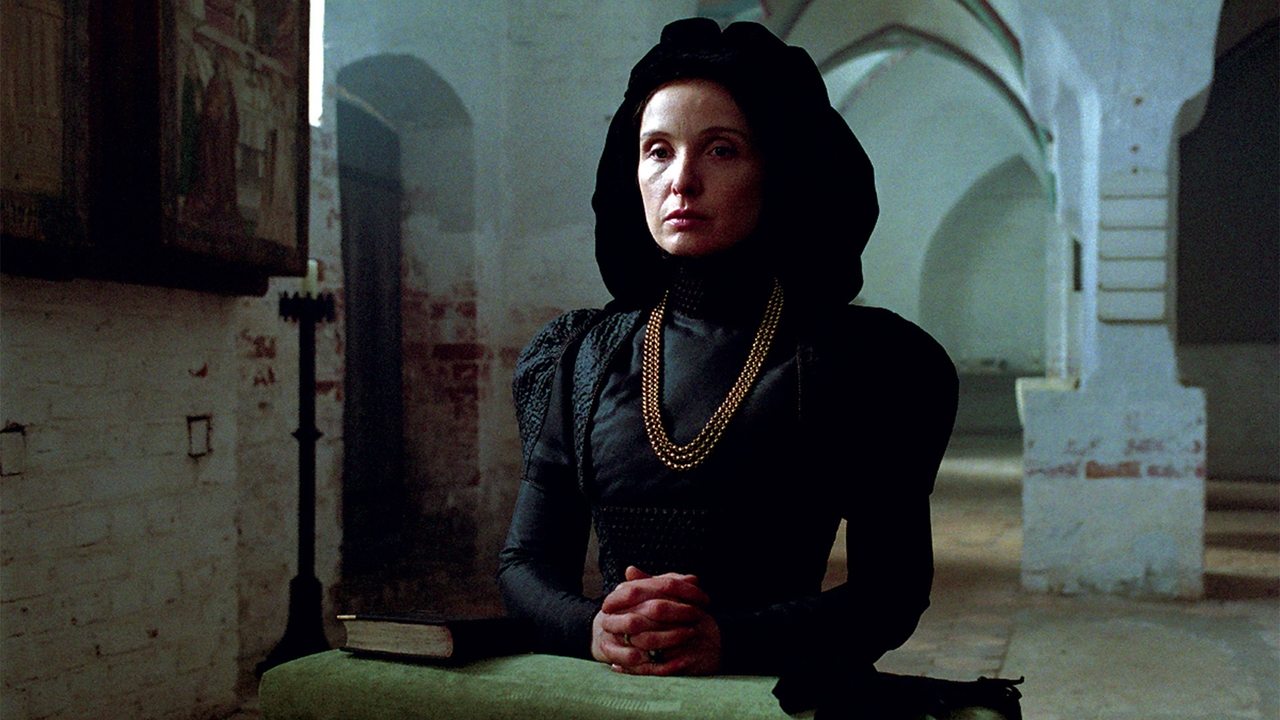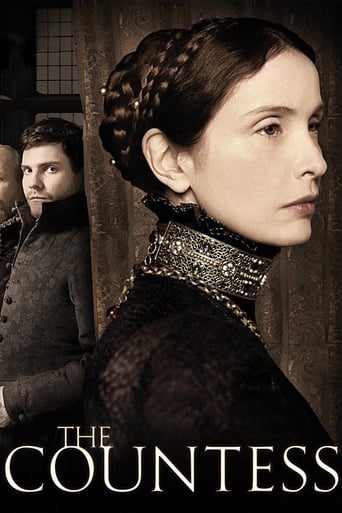

This movie is the proof that the world is becoming a sick and dumb place
... View MoreA film of deceptively outspoken contemporary relevance, this is cinema at its most alert, alarming and alive.
... View MoreThe story, direction, characters, and writing/dialogue is akin to taking a tranquilizer shot to the neck, but everything else was so well done.
... View MoreOne of those movie experiences that is so good it makes you realize you've been grading everything else on a curve.
... View MoreThis movie rocks because it manages to be both a lavish, complex period movie and a psychological horror movie at the same time. Julie Delpy does a fantastic job in the role of a complex woman from a brutal period in European history, and her performance somehow gracefully manages to be both sympathetic and monstrous. Bathory is one of history's most prolific and sadistic mass murderers, but historians are ultimately unsure of who she really was, and to what extent she was responsible for the atrocities for which she is credited. Most agree that the whole "beauty treatment bloodbath" thing is a myth made up by later generations to spice up the story, so I was surprised that a telling supposedly rooted in fact ended up going that route, but I loved the idea of a Bathory who is a real person and not just a 2-dimensional fiend. Great sets, costumes, and performances from a well-written script make The Countess an engaging and informative portrait of a woman whose vanity and blood lust have become the stuff of legend.
... View MoreWell, actually, in the Little Carpathians, apparently, which are not part of Transylvania, or so Wikipedia tells me. I really enjoyed this film (at home on pay-per-view)though I think it is intended for a pretty narrow audience. As others have noted, the dialogue is amazingly stilted (very literary, rather like a French novel of the 17th or 18th century) and delivered in near-monotone. I kept feeling that the whole movie had been dubbed into English. On the other hand, I found the acting very fine, and I admired the insistence on presenting these characters as not at all like you, me, or the folks in the latest TV drama. The Countess in particular is a strange, unique portrait--her piety, her desire for amorous adventure, her pride, her intelligence. And that's before you get to the blood-of-virgins part.The film proposes that what we are seeing before our eyes is not the truth about the Countess. We are watching a fantasy of a noblewoman enacting a tale "told by the victors"--by the men who were enriched by her downfall and relieved, too, to be rid of the very possibility of an intelligent woman. The tale is told, too, by the peasants and others whose sons are fighting in her army. Yet the man who questions the gory story is her lover, and he too may be deceived. There is no simple answer to the question, what really happened?--no resolution.In short, it's an intellectual (and visual) treat, but it won't affect your blood sugar.
... View MoreWriter/director/producer/musical scorer/actress Julie Delpy brings to the screen a character from history that few know. The film is based on the true history of the woman known as The Blood Countess, but after viewing this film it is obvious that the actual figure on whom the story is based was a brilliant political mind, a woman of noble breeding who could read and write in four languages, who once widowed was able to successfully defend her lands from the warring Turks and exact control over the reigning Hungarian King Matthias. But back to the history of the character as written by Delpy. 'Countess Elizabeth Báthory de Ecsed (Báthory Erzsébet in Hungarian) (1560 - 1614) was a countess from the renowned Báthory family of Hungarian nobility. She is considered the most prolific female serial killer in history and possibly the most prolific of any gender. She and four collaborators were accused of torturing and killing hundreds of girls, with one witness attributing to them over 650 victims, though the number for which they were convicted was 80. Erzsébet herself was neither tried nor convicted. In 1610, however, she was imprisoned in the Csejte Castle, where she remained bricked in a set of rooms until her death four years later. Later writings about the case have led to legendary accounts of the Countess bathing in the blood of virgins in order to retain her youth.' The film opens with voice over by István Thurzó (Daniel Brühl) who relates the story of his only love. We are privy to the strange behaviors of the young Erzsébet who had a sadistic streak and was at birth promised to be the bride of Ferenc Nádasdy (Charly Hübner). She became a beautiful woman and Erzsébet (Julie Delpy) married General Nádasdy, gave birth to children, and together they were the power couple of Hungary. When Nádasdy dies, Erzsébet meets and falls passionately in love with István Thurzó (Daniel Brühl), a many 19 years her junior, but Istvan's father György Thurzó (William Hurt) prevents Istvan from remaining with Erzsébet. Left alone Erzsébet remains a powerful warrior, dallies with the sadomasochistic Dominic Vizakna (Sebastian Blomberg), but fears her young lover will forget her if she ages. She discovers that the blood from virgins will restore her youth and thus begins the serial killings to support her vanity. As questions of debts owed to her by the King there is an investigation of her personal history led by György Thurzó and without proper trial she is condemned to house arrest in darkened sealed rooms in her own Csejte Castle where her fate is sealed. The film is beautifully designed, costumed, photographed and scored, and Delpy manages to pace her story credibly and well. For this viewer there is an absence of gritty passion that would make the history more indelible: Delpy and the remainder of the cast fail to create fiery on-screen chemistry that would have brought a sense of stronger impetus to the heinous acts that occur. But as a piece of rarely known history it is a fascinating film about a strong woman of the past and the impact she had on her country ... and on legends! Grady Harp
... View MoreIf one could rate a film owing entirely to the versatility of its creator, The Countess would be 10 out of 10. Julie Delpy didn't just helm her most ambitious project to date, she gives a carefully reserved, effective performance, she composed a befitting score, she had an active part in costume design, and her script gives the right angles at the right places. Why then does the final result impress so little, unlike her wonderful debut "2 Days in Paris"? Reason One: Insufficient voice coaching. You may think that's a minor detail - wait until you've watched this film in its original English. With the four main characters coming from four different countries, one would assume that their English accents would be balanced by someone - nope. The dialogue sounds awkward and sort of trashy. Julie Delpy's own cute French-American sounds odd in this somber tale; Daniel Brühl's German-American accent is so ridiculous that one expects him to pronounce 'I vont tu sukk ur bluhd' any second. William Hurt, being the seasoned pro that he is, smoothed his own accent to fit into his morose, cunning character, making him sound more European than the Europeans. Anamaria Marinca obviously had some serious vocal training, which elevates her performance, whereas Delpy and Brühl's romance scenes give off a feeling of unbalance and weirdness.Reason Two: Daniel Brühl. Well, this is a French-German co-production, so I guess that, as the unwritten rules of Eurofilm prescribe, there has to be a German lead. And Brühl could be considered a star. Yet he does not have the stamina to carry such a part; he mostly acts as a bystander. He's not even pretty, as he looks quite sick. And according to an interview I've read, Delpy isn't totally innocent of Brühl's look, since she mentioned that she didn't want him to shape up.Reason Three: German production values. The main production company involved in this project is Tom Tykwer's X-Filme, so this movie feels very German. If you've watched The Perfume, you know what that means for dramas like this one: a certain stiffness in tackling emotional content and rather Spartan set design. The Iron Maiden, which the Countess uses to bleed her virgin victims dry, is about the only visually interesting detail. The continuity is muffled, too; for instance, the escape scene of a little girl, one of the rare moments of suspense, is almost instantly killed off, quite literally, not allowing for goosebumps to build.It's OK that Julie Delpy makes a clear departure from the romantic fluffy stuff of her past. It's impressive how versatile she's become as a film maker. But given her talent for intelligent comedy, I wonder if a less serious subject wouldn't have benefited her versatility more. This not-really period piece and not-really horror flick will satisfy nobody and keep audiences wonder how much more it could have been with another approach.
... View More